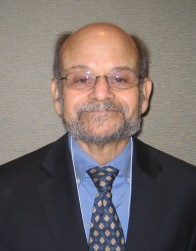User login
SAN FRANCISCO – New drugs aimed at treating the nonpsychotic symptoms of schizophrenia that impair patients’ daily functioning are likely to move into the clinic soon, predicts Dr. Stephen R. Marder, professor and director of the section on psychosis at the Semel Institute for Neuroscience and Human Behavior at the University of California, Los Angeles.
Antipsychotics have been available since the early 1950s, but functional impairments for people with schizophrenia continue to persist, he said. In fact, fewer than 20% are able to work independently, he said at the annual meeting of the American Psychiatric Association. Until recently, "clinical practice was focused on what drugs were able to do, which was to dampen the psychotic symptoms of schizophrenia, and drug development was at a halt," said Dr. Marder, who also serves as director of the Mental Illness Research, Education, and Clinical Center, Los Angeles.
But that has changed, thanks to MATRICS (Measurement and Treatment Research to Improve Cognition in Schizophrenia), a collaborative effort of about 300 investigators focused on facilitating drug development for nonpsychotic symptoms.
"If the goal is to be able to improve the functioning in schizophrenia – for people to be able to work, live independently, participate in family and social life – there are some attractive targets: basic cognition, negative symptoms, and social cognition," Dr. Marder explained.
Roughly a half-dozen agents targeting these symptoms are now in phase II or III clinical trials. "We are at a stage where ... it’s conceivable that in late 2014 or 2015, we will actually have a drug for negative symptoms, with other drugs for cognition following shortly thereafter," he said "So it’s a time of optimism."
A relatively new area of research focus in schizophrenia is impairment of social cognition and the ability to read other people based on cues such as body language, facial expressions, and tone of voice.
Emerging data suggest that the naturally occurring hormone and neurotransmitter oxytocin, long used in obstetrics, is beneficial in this context.
"It is involved in multiple aspects of social behavior and related emotions," Dr. Marder noted. Administration to mentally healthy individuals has been associated with increased trust when playing games and increased sensitivity to social signals.
In a phase II trial, patients with schizophrenia had better uptake of social cognition training when given intranasal oxytocin, as compared with placebo, shortly before training began.
Relative to placebo, oxytocin did not improve low-level function, such as ability to interpret facial expressions. However, it did improve high-level function, such as the ability to detect sarcasm, assessed in the study with a test of empathic accuracy. Moreover, the effect was sustained, lasting at least a month.
Thus, an old drug might eventually find new use to treat a complex symptom of schizophrenia, he said.
"We are feeling relatively optimistic that these efforts are going to lead, in the relatively near future, to better treatment," Dr. Marder said.
Dr. Marder disclosed that he is on the advisory boards of numerous pharmaceutical companies, including Abbott, Amgen, Roche, Shire, Otsuka, Wyeth, Pfizer, and Lundbeck, and that he receives research support from Novartis, GlaxoSmithKline, Sunovion, and PsychoGenics.
Antipsychotics, American Psychiatric Association, Mental Illness Research, Education, and Clinical Center, Los Angeles. MATRICS, Measurement and Treatment Research to Improve Cognition in Schizophrenia,
SAN FRANCISCO – New drugs aimed at treating the nonpsychotic symptoms of schizophrenia that impair patients’ daily functioning are likely to move into the clinic soon, predicts Dr. Stephen R. Marder, professor and director of the section on psychosis at the Semel Institute for Neuroscience and Human Behavior at the University of California, Los Angeles.
Antipsychotics have been available since the early 1950s, but functional impairments for people with schizophrenia continue to persist, he said. In fact, fewer than 20% are able to work independently, he said at the annual meeting of the American Psychiatric Association. Until recently, "clinical practice was focused on what drugs were able to do, which was to dampen the psychotic symptoms of schizophrenia, and drug development was at a halt," said Dr. Marder, who also serves as director of the Mental Illness Research, Education, and Clinical Center, Los Angeles.
But that has changed, thanks to MATRICS (Measurement and Treatment Research to Improve Cognition in Schizophrenia), a collaborative effort of about 300 investigators focused on facilitating drug development for nonpsychotic symptoms.
"If the goal is to be able to improve the functioning in schizophrenia – for people to be able to work, live independently, participate in family and social life – there are some attractive targets: basic cognition, negative symptoms, and social cognition," Dr. Marder explained.
Roughly a half-dozen agents targeting these symptoms are now in phase II or III clinical trials. "We are at a stage where ... it’s conceivable that in late 2014 or 2015, we will actually have a drug for negative symptoms, with other drugs for cognition following shortly thereafter," he said "So it’s a time of optimism."
A relatively new area of research focus in schizophrenia is impairment of social cognition and the ability to read other people based on cues such as body language, facial expressions, and tone of voice.
Emerging data suggest that the naturally occurring hormone and neurotransmitter oxytocin, long used in obstetrics, is beneficial in this context.
"It is involved in multiple aspects of social behavior and related emotions," Dr. Marder noted. Administration to mentally healthy individuals has been associated with increased trust when playing games and increased sensitivity to social signals.
In a phase II trial, patients with schizophrenia had better uptake of social cognition training when given intranasal oxytocin, as compared with placebo, shortly before training began.
Relative to placebo, oxytocin did not improve low-level function, such as ability to interpret facial expressions. However, it did improve high-level function, such as the ability to detect sarcasm, assessed in the study with a test of empathic accuracy. Moreover, the effect was sustained, lasting at least a month.
Thus, an old drug might eventually find new use to treat a complex symptom of schizophrenia, he said.
"We are feeling relatively optimistic that these efforts are going to lead, in the relatively near future, to better treatment," Dr. Marder said.
Dr. Marder disclosed that he is on the advisory boards of numerous pharmaceutical companies, including Abbott, Amgen, Roche, Shire, Otsuka, Wyeth, Pfizer, and Lundbeck, and that he receives research support from Novartis, GlaxoSmithKline, Sunovion, and PsychoGenics.
SAN FRANCISCO – New drugs aimed at treating the nonpsychotic symptoms of schizophrenia that impair patients’ daily functioning are likely to move into the clinic soon, predicts Dr. Stephen R. Marder, professor and director of the section on psychosis at the Semel Institute for Neuroscience and Human Behavior at the University of California, Los Angeles.
Antipsychotics have been available since the early 1950s, but functional impairments for people with schizophrenia continue to persist, he said. In fact, fewer than 20% are able to work independently, he said at the annual meeting of the American Psychiatric Association. Until recently, "clinical practice was focused on what drugs were able to do, which was to dampen the psychotic symptoms of schizophrenia, and drug development was at a halt," said Dr. Marder, who also serves as director of the Mental Illness Research, Education, and Clinical Center, Los Angeles.
But that has changed, thanks to MATRICS (Measurement and Treatment Research to Improve Cognition in Schizophrenia), a collaborative effort of about 300 investigators focused on facilitating drug development for nonpsychotic symptoms.
"If the goal is to be able to improve the functioning in schizophrenia – for people to be able to work, live independently, participate in family and social life – there are some attractive targets: basic cognition, negative symptoms, and social cognition," Dr. Marder explained.
Roughly a half-dozen agents targeting these symptoms are now in phase II or III clinical trials. "We are at a stage where ... it’s conceivable that in late 2014 or 2015, we will actually have a drug for negative symptoms, with other drugs for cognition following shortly thereafter," he said "So it’s a time of optimism."
A relatively new area of research focus in schizophrenia is impairment of social cognition and the ability to read other people based on cues such as body language, facial expressions, and tone of voice.
Emerging data suggest that the naturally occurring hormone and neurotransmitter oxytocin, long used in obstetrics, is beneficial in this context.
"It is involved in multiple aspects of social behavior and related emotions," Dr. Marder noted. Administration to mentally healthy individuals has been associated with increased trust when playing games and increased sensitivity to social signals.
In a phase II trial, patients with schizophrenia had better uptake of social cognition training when given intranasal oxytocin, as compared with placebo, shortly before training began.
Relative to placebo, oxytocin did not improve low-level function, such as ability to interpret facial expressions. However, it did improve high-level function, such as the ability to detect sarcasm, assessed in the study with a test of empathic accuracy. Moreover, the effect was sustained, lasting at least a month.
Thus, an old drug might eventually find new use to treat a complex symptom of schizophrenia, he said.
"We are feeling relatively optimistic that these efforts are going to lead, in the relatively near future, to better treatment," Dr. Marder said.
Dr. Marder disclosed that he is on the advisory boards of numerous pharmaceutical companies, including Abbott, Amgen, Roche, Shire, Otsuka, Wyeth, Pfizer, and Lundbeck, and that he receives research support from Novartis, GlaxoSmithKline, Sunovion, and PsychoGenics.
Antipsychotics, American Psychiatric Association, Mental Illness Research, Education, and Clinical Center, Los Angeles. MATRICS, Measurement and Treatment Research to Improve Cognition in Schizophrenia,
Antipsychotics, American Psychiatric Association, Mental Illness Research, Education, and Clinical Center, Los Angeles. MATRICS, Measurement and Treatment Research to Improve Cognition in Schizophrenia,
EXPERT ANALYSIS FROM THE APA ANNUAL MEETING

